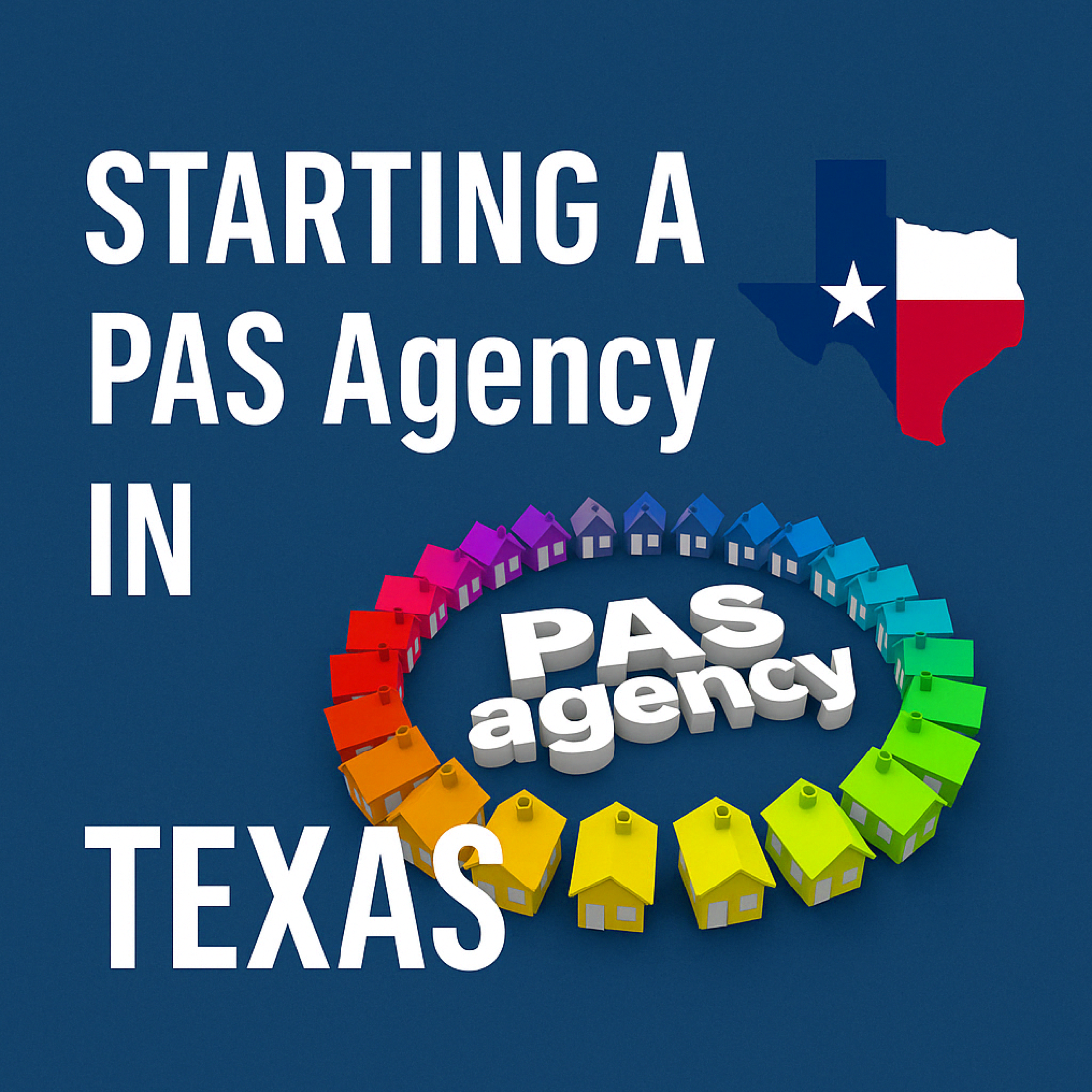
How to Start A PAS Agency in Texas 2025
Thinking about starting your own PAS agency in Texas? You’re in the right place. This guide walks you through exactly what it takes to get licensed, get launched, and get profitable in one of the fastest-growing industries in the U.S.
The good news?
Personal Attendant Services (PAS) is one of the most in-demand business models across Texas and the nation. With over 73 million baby boomers either currently receiving or soon needing in-home support, demand is high and rising. That means real opportunity for aspiring agency owners who execute with the right structure and guidance.
My name is Shae from 123 Consulting Solutions. I’ve owned a million-dollar home care agency, and now I help new agency owners launch and grow with confidence. If you want to know how to do this right (from licensing to staffing to operations), this guide is your starting point.
What Is PAS?

PAS stands for Personal Attendant Services. In Texas, it falls under the Home and Community Support Services Agency (HCSSA) license, which is issued by the Texas Health and Human Services Commission (HHSC).
Outside of Texas, PAS is often referred to as non-medical home care, personal care, or private duty care. These services help individuals remain independent in their homes by supporting daily living tasks, without the need for medical care.
Types of PAS Agencies in Texas
PAS agencies provide assistive services to individuals in:
-
Private homes
-
Independent living apartments
-
Assisted living communities
Many individuals choose PAS care because they want to maintain their independence and avoid institutional settings. The key is offering help that respects their lifestyle, privacy, and dignity.
Texas PAS agencies generally fall into one or more of the following categories:
-
Private Pay Agencies: Clients pay out-of-pocket for care.
-
Home Health Agencies: Offer both skilled and non-medical services.
-
Medicaid-Funded Agencies: Serve clients referred by caseworkers in state Medicaid programs.
-
Agencies with MCO Contracts: Work with providers like Superior, Molina, Amerigroup, UnitedHealthcare, and the VA.
Years ago, home health agencies provided most of the in-home support. Today, private-pay non-medical care has carved out its own space, and many new agency owners are choosing to specialize in it.
What Services Do PAS Agencies Provide?
Services provided by PAS agencies can be divided into two types:
1. Activities of Daily Living (ADLs)
These include personal care tasks such as:
-
Bathing
-
Dressing
-
Eating
-
Toileting
-
Walking
-
Transferring (bed to chair, etc.)
-
Taking medication
2. Instrumental Activities of Daily Living (IADLs)
These support independent living and include:
-
Meal prep
-
Light housekeeping
-
Running errands
-
Grocery shopping
-
Medication reminders
-
Transportation
How Do PAS Agencies Get Paid?

Before we go into the steps, let’s talk about the question every new agency owner has: “How do I get paid?”
The good news is there are several ways to get paid. Let’s go through this by the most lucrative down to the least lucrative payer:
-
VA Clients: The best paying clients. You can get paid $30/hour or more depending on your location.
-
Private Pay Clients: The second best. Rates typically range from $25–$30/hour depending on your market.
-
Long-Term Care Insurance: Pays directly or reimburses families.
-
Managed Care Organizations (MCOs): Often lower rates but offer a consistent referral stream.
-
Medicaid: Pays for services provided to low-income individuals, often through the CDS (Consumer Directed Services) model.
The State Medicaid program allows these services to be provided by the client’s family and friends, with the hourly wage starting at $12 and goes up to $16 an hour. Keep in mind the hourly rate is constantly changing depending on rule changes and rate enhancements.
Where Do You Start From?

Step 1: Decide who will be your administrator and alternate administrator
Before you start you have to know the requirements for opening a PAS agency. HHSC states that you will need an administrator and an alternate administrator just in case you or whoever is the administrator is not available to care for the clients and to attend the state survey.
Administrator Qualifications (Both Must Meet One of the Following):
-
Be a physician, RN, social worker, or licensed nursing facility administrator
OR -
Have a high school diploma/GED and one of the following:
-
Two years of supervisory experience in a health-related setting
-
One year of caregiving experience (professional or family-based)
-
Two years of full-time study in a health-related college program
Make sure both individuals meet these criteria before you move forward.
Step 2: Choose a Strong Business Name
We have assisted clients who come up with the most interesting names. The problem is the name they choose either becomes a hindrance or it isn’t a marketable tool.
Always keep this in mind from the time you start your agency, you are in this for the client, not for yourself.
Many home care owners choose their own names, use names that memorialize family members, or use names that has nothing to do with what they do. This is a big mistake. Instead, always keep your clients in mind by using names that they can easily remember.
Tips for choosing a name:
-
Make it easy to remember, pronounce, spell, and associate with home care.
-
Include terms like “home care” or “personal care” to boost SEO and search visibility.
-
Start with an “A” or a number (like 123 Home Care). This gives you a listing advantage in referral booklets that are sorted alphabetically.
-
Avoid overly personal names. Your brand should reflect your clients’ needs, not just your personal story.
Step 3: Register Your Business Entity
Go to the Texas Secretary of State’s website.
-
Create an account
-
Search for available names. Also check Google! I have come across names that weren’t in the Secretary of State website but showed up in Google, this will affect your clients finding your company when they do a search.
-
Register your business structure
There are various types of business structure you can choose from:
-
LLC: Popular for tax flexibility and liability protection.
-
Sole Proprietorship: Easiest to set up, but least protection.
-
Corporation: More structure, more regulation.
The type of business you form will determine how much tax you pay, what kind of organizational structure your business will have, and the personal obligations you assume as a result.
Pro tip: Most startups benefit from starting as an LLC, because you will pay the least amount in taxes until you cross 40-80k in net profits then it would be smarter to switch to S Corp. Always speak with your accountant to confirm what’s best for your goals.
Step 4: Get Your EIN (Employer Identification Number)
Visit the IRS EIN portal to obtain your company Employer Identification Number (EIN) number. It’s fast, free, and required for banking, taxes, and payroll.
Step 5: Decide Your Company Address, Phone Number, Domain Name & Email Address
Starting out many PAS agencies start from home to reduce cost and for convenience, if you can save some money why not?
If you plan on using your home you have to dedicate a space in your home specifically for the office and it has to be comfortable enough for the state surveyor to come in and operate from.
You’ll need:
-
A dedicated phone line:
Be mindful of the fact this is the phone line you will receive calls from clients, state surveyors, employees. It will not be convenient and actually bad for business to use the same number you use to answer family calls to answer client calls. You can however solve this problem by using an internet phone line like RingCentral which gives you a dedicated phone number and an app you can use to answer calls.
-
A business domain name:
Getting a business domain name for your website is simple. Visit platforms like Squarespace or GoDaddy and search for a domain name that represents your business, such as ABChomecare.com. Once you’ve secured your domain, these companies also allow you to set up a professional email address.
-
An email address:
Since we’re building a professional entity, it’s important to use an email address that reflects that. I’m often surprised to see agencies using Gmail or Yahoo addresses—it doesn’t look professional. Instead, register an email like info@abchomecare.com, not abchomecare@gmail.com. A professional email leaves a lasting impression and aligns with your brand
Step 6: Complete Required Training
Before you can submit your application to the state the administrator and the alternate administrator must complete:
For your PAS license you’ll need to do modules 1, 2, and 3 and save the certificates to be uploaded to TULIP which we will discuss in the next section.
-
Texas Administrator 8-Hour Class
Once you have the certificates from the CBT modules, the administrator and the alternate administrator will need to complete the Texas administrator 8 class which you can take at 123ConsultingSolutions.com
-
Use code 123LOVESYOU for $20 off. Because we do.
Print out the two certificates because they will have to be uploaded to TULIP. You need 24 hours of initial training for the first year but for the sake of getting your license the state allows you to upload the Texas administrator 8 certificates for the admin and the alt admin.
Step 7: Create a TULIP Account
Next go to the TULIP, the Texas Unified Licensure Information Portal and create your agency account.
Complete the information required in the application portal then move on to the next step.
Step 8: Application submission
Before you submit your application you will need to upload the following three policies:
-
Policy about the organizational structure of your company.
-
Policy on transferring a client or agency closure.
-
Your plan for continued education of the administrative staff.
HHS wants to know that you have a structure already set up. You can download templates for free at 123ConsultingSolutions.com.
Once your policies are ready, upload them in TULIP and pay the $2,625 application fee. Going forward from here you will have to renew every three years.
Expect HHSC to review your submission within 45 days. As long as you have done your part and made no mistakes in the application it shouldn’t take longer than that.
While You Wait: Prepare to Launch

Step 9: Open Your Business Bank Account
I would advise you to open one with four sub-accounts in one:
-
One is for payroll.
-
The second is for owner compensation.
-
Third is for taxes.
-
And fourth is for business reinvestments.
We will revisit this topic in a future class on 123ConsultingSolutions.com so subscribe to our channel.
Step 10: Build Your Website and Logo
Next is the website and the logo. There are inexpensive ways to get a logo made for you or you can make one yourself using Canva.com. If you would like to hire a professional, head over to Fiverr.com and find a reasonably priced one for $25-$50.
Your website is your digital business card and needs to express exactly what your company does and it has to be easy for the user to understand and find the information they need.
Your website should clearly explain:
-
Who you are
-
What services you provide
-
Where you serve
-
How people can contact you
In our masterclass we will teach you how to create an effective website that helps you to get leads and grow your email list.
Step 11: Purchase or Draft Your Policies and Procedures
Your policies and procedures should have:
-
PAS Policy Manual.
-
Emergency Preparedness Plan.
-
Quality Assurance/Performance Improvement (QAPI) Binder.
-
Satisfaction survey binder.
-
Employee handbook.
-
Employee binder.
-
Client Admission Packet.
-
Complaint & Infection Control Binders.
We have these on our website so reach out to us and we will get them customized for you.
Step 12: Develop Your Recruitment and Retention Plan
While you are waiting for your license, spend time finding quality staff and training them in anticipation for your launch.
You will need at least two good caregivers on board so that when you do get a referral you aren’t running around wondering how to staff the client. You can hire, onboard and train them on TelescopeHR.com
Train your team on:
-
Communication
-
Client safety
-
Reliability
-
HIPAA compliance
Make caregiver quality part of your brand from day one.
Step 13: Set Up Your Operations Systems
Last step? Build your back-office systems:
-
Payroll: Gusto, ADP
-
Billing: QuickBooks, CareSmartz360
-
Scheduling: AxisCare, WellSky
-
Timekeeping: EVV (Electronic Visit Verification) system
Solid operations reduce stress, support compliance, and set your agency up for long-term success.
You Don’t Have to Do It Alone
Starting your own agency is exciting, but it can also be overwhelming and time consuming. That’s where we come in.
At 123 Consulting Solutions, we help you every step of the way:
-
Application and licensing support
-
Policies and procedures
-
Medicaid contract assistance
-
Referral strategies and marketing
-
Workforce development and retention
Click on the subscribe button for more resources, and give us a call to learn how we can help you launch your agency the right way.
Your dream is possible. Let’s build it—together.